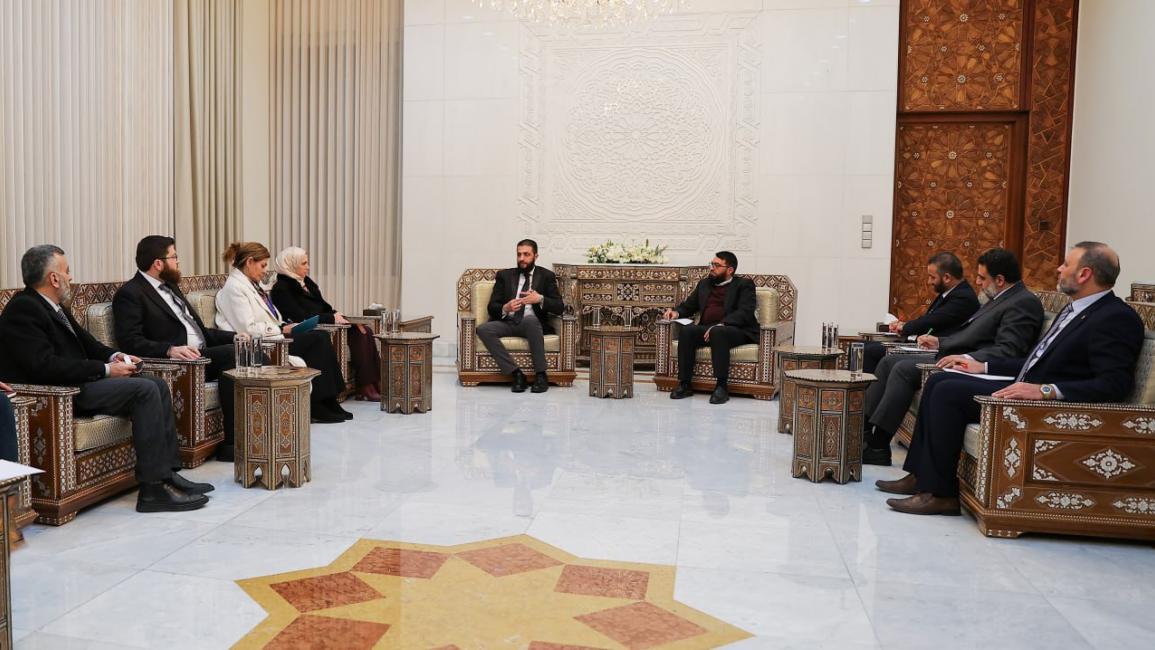The spokesperson for the Preparatory Committee for the National Dialogue Conference, Hassan al-Dughaim, told SANA that the national dialogue began with the fall of the Syrian regime. He noted that the Preparatory Committee has commenced its work, outlining the criteria it will use to invite citizens to the conference while postponing discussions on the specific issues to be addressed.
Al-Dughaim stated: “All Syrians, whether through intensive meetings between the leadership and popular delegations or among the various societal components, recognized that these meetings were not mere introductions but rather the groundwork culminating today in the launch of preparatory efforts for the National Dialogue Conference.” He explained that the committee has begun its work “drawing on and inspired by the previous phase in developing mechanisms—both for content management and technical organization. The work will span all levels, including preparation, communication, provincial visits, engagement with citizens, Syrian dignitaries, and elites, as well as exploring practical methods to ensure the representation of different social groups based on population distribution, expertise, specializations, and social influence.”
Regarding the timing of the conference, al-Dughaim remarked: “Once the process of communication matures and the preliminary working papers are prepared, the National Dialogue Conference will undoubtedly be convened. It will provide Syrians with the foundation from which they can, for the first time since 1950, begin rebuilding their country’s future.”
In Each Governorate
The spokesperson, whose committee members’ names were revealed yesterday, emphasized that “in principle, every patriotic Syrian—man or woman—is part of the national dialogue. However, given the current circumstances, organizing the conference in a structured manner is crucial to ensuring substantive discussions are not overshadowed by procedural formalities. Therefore, nationalism, influence, specialization, symbolism, experience, and potential contributions will be the key criteria guiding the Preparatory Committee in selecting participants.”
Regarding the representation of different governorates in the conference, he explained: “Meetings will be held with citizens in each Syrian governorate to assess its unique characteristics and diversity, ensuring that national figures capable of representing each region’s interests are chosen in alignment with the broader national interest.” He stressed: “The committee will not promote sectarianism or enforce sectarian quotas—this is entirely unacceptable. However, it will take Syria’s diverse social fabric into account to ensure that each governorate’s representation reflects its demographic and societal makeup.”
He further clarified that the committee’s role is to oversee the national dialogue by organizing, coordinating, and facilitating discussions, helping participants achieve meaningful outcomes. Its work will conclude upon the issuance of the final statement, as stipulated by the presidential decree.
As for the topics to be discussed at the conference, he stated that they will emerge through exchanges of views, visits to different governorates, and the drafting of working papers, with further details expected to unfold in the coming days. He added: “The Preparatory Committee’s mission is to assist Syrians in managing dialogue among themselves, exchanging perspectives on shaping their country’s governance and future—whether in sovereign, structural, or service-related matters. The committee is committed to ensuring transparency, impartiality, and integrity in facilitating the conference.”
Al-Dughaim also highlighted the constitutional implications, emphasizing that, following the suspension of the 2012 Constitution, the country requires a constitutional declaration to fill the resulting legal vacuum. While the president could have issued such a declaration immediately upon assuming power, the leadership preferred to align this step with the National Dialogue Conference to incorporate its recommendations into the country’s constitutional framework, whether on an interim or permanent basis.
He elaborated: “The leadership’s commitment to the success of the conference led to multiple postponements of its launch, even though preparations have been ongoing in practice. In this context, the Preparatory Committee operates with full independence, appointing its own chairman, setting its agenda, and determining the segments of society to be invited based on internal regulations it establishes.”
On the issue of transitional justice, he stressed that “it is fundamental to rebuilding the Syrian state and driving it toward a new era. National reconciliation and civil peace cannot be achieved without transitional justice, which will undoubtedly be among the highest priorities of the National Dialogue.”
This article was translated and edited by The Syrian Observer. The Syrian Observer has not verified the content of this story. Responsibility for the information and views set out in this article lies entirely with the author.


